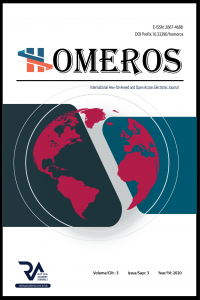Abstract
Some Russian semantic archaisms are still used in the other Slavic languages (Ukrainian, Polish, Serbian). The historical excursus is carried out in the article, as necessary.
So though the meanings of the Russian and Azerbaijani words considered in the article are archaic they are preserved in the structure of the modern words and might be relevant to the specific fields. They are used as terms in the different fields of science, they are preserved in the dialects, folklore. They are also important components of idioms, proverbs, sayings as they are relics of the past retained in the modern Russian and Azerbaijani languages. They have their own characteristics that makes them unique lexical items.
Research of such semantic changes caused by the different factors is very interesting and significance both from the linguistic and historical standpoints.
Keywords
semantic changes semantic archaism vocabulary Russian Azerbaijani language factors historical development
References
- Azərbaycan dilinin izahlı lüğəti. 2006, Dörd cilddə, Bakı
- BAYRAMOV İ. 1999, Müasir Azərbaycan ədəbi dilinin zənginləşməsi yolları. ADPU-nun nəşri. Bakı
- CƏFƏROV Q.H. 1984, Azərbaycan dilinin leksik-semantik sistemi. Bakı
- ƏZIZOV E.İ. 1999, Azərbaycan dilinin tarixi dialektologiyası. Bakı
- HƏMIDOV İ.H. 2004, Azərbaycanca-rusca atalar sözləri lüğəti. Bakı
- XƏLILOV B. 2008, Müasir Azərbaycan dilinin leksikologiyası. Bakı
- MƏHƏRRƏMOVA R. 2012, XV-XVI əsrlər Azərbaycan ədəbi dili: leksika, söz yaradıcılığı. Bakı
- MƏMMƏDOV İ. 2006, Azərbaycan dilinin semantikası. Bakı------------------------
- SADIQOVA S. 2005, Azərbaycan dilində terminologiyanın təşəkkülü və inkişafı. Bakı
- Большой энциклопедический словарь. 2004, 2-е издание, перерабо¬танное и дополненное. Москва
- КРЫСИН Л.П. 2007, Современный русский язык. Лексикология. Фразеология. Лексикография. Москва
- ЛЕВИЦКИЙ В.В. Семасиология. 2012, Москва -------------------------
- Русско-английский словарь. 1989, Под общим руководством проф. А.И. Смирницкого. Москва
- СУПЕРАНСКАЯ А.В., ПОДОЛЬСКАЯ Н.В., ВАСИЛЬЕВА Н.В. 1989, Общая терминология. Вопросы теории. Москва
- Толковый словарь русского языка. 1985, 1986, 1987, 1988, в четырех томах. Москва
- ШАНСКИЙ Н.М. 2009, современный русский язык. Москва------------------------- DAVID P. 1996, Wilkins, "Natural Tendencies of Semantic Change and the Search for Cognates" in The Comparative Method Reviewed, ed. by M. Durie and M. Ross. Oxford University Press.
Abstract
Some Russian semantic archaisms are still used in the other Slavic languages (Ukrainian, Polish, Serbian). The historical excursus is carried out in the article, as necessary.
So though the meanings of the Russian and Azerbaijani words considered in the article are archaic they are preserved in the structure of the modern words and might be relevant to the specific fields. They are used as terms in the different fields of science, they are preserved in the dialects, folklore. They are also important components of idioms, proverbs, sayings as they are relics of the past retained in the modern Russian and Azerbaijani languages. They have their own characteristics that makes them unique lexical items.
Research of such semantic changes caused by the different factors is very interesting and significance both from the linguistic and historical standpoints.
Keywords
semantic changes semantic archaism vocabulary Russian Azerbaijani language factors historical development
References
- Azərbaycan dilinin izahlı lüğəti. 2006, Dörd cilddə, Bakı
- BAYRAMOV İ. 1999, Müasir Azərbaycan ədəbi dilinin zənginləşməsi yolları. ADPU-nun nəşri. Bakı
- CƏFƏROV Q.H. 1984, Azərbaycan dilinin leksik-semantik sistemi. Bakı
- ƏZIZOV E.İ. 1999, Azərbaycan dilinin tarixi dialektologiyası. Bakı
- HƏMIDOV İ.H. 2004, Azərbaycanca-rusca atalar sözləri lüğəti. Bakı
- XƏLILOV B. 2008, Müasir Azərbaycan dilinin leksikologiyası. Bakı
- MƏHƏRRƏMOVA R. 2012, XV-XVI əsrlər Azərbaycan ədəbi dili: leksika, söz yaradıcılığı. Bakı
- MƏMMƏDOV İ. 2006, Azərbaycan dilinin semantikası. Bakı------------------------
- SADIQOVA S. 2005, Azərbaycan dilində terminologiyanın təşəkkülü və inkişafı. Bakı
- Большой энциклопедический словарь. 2004, 2-е издание, перерабо¬танное и дополненное. Москва
- КРЫСИН Л.П. 2007, Современный русский язык. Лексикология. Фразеология. Лексикография. Москва
- ЛЕВИЦКИЙ В.В. Семасиология. 2012, Москва -------------------------
- Русско-английский словарь. 1989, Под общим руководством проф. А.И. Смирницкого. Москва
- СУПЕРАНСКАЯ А.В., ПОДОЛЬСКАЯ Н.В., ВАСИЛЬЕВА Н.В. 1989, Общая терминология. Вопросы теории. Москва
- Толковый словарь русского языка. 1985, 1986, 1987, 1988, в четырех томах. Москва
- ШАНСКИЙ Н.М. 2009, современный русский язык. Москва------------------------- DAVID P. 1996, Wilkins, "Natural Tendencies of Semantic Change and the Search for Cognates" in The Comparative Method Reviewed, ed. by M. Durie and M. Ross. Oxford University Press.
Abstract
Keywords
semantic changes semantic archaism vocabulary Russian Azerbaijani language factors historical development
References
- Azərbaycan dilinin izahlı lüğəti. 2006, Dörd cilddə, Bakı
- BAYRAMOV İ. 1999, Müasir Azərbaycan ədəbi dilinin zənginləşməsi yolları. ADPU-nun nəşri. Bakı
- CƏFƏROV Q.H. 1984, Azərbaycan dilinin leksik-semantik sistemi. Bakı
- ƏZIZOV E.İ. 1999, Azərbaycan dilinin tarixi dialektologiyası. Bakı
- HƏMIDOV İ.H. 2004, Azərbaycanca-rusca atalar sözləri lüğəti. Bakı
- XƏLILOV B. 2008, Müasir Azərbaycan dilinin leksikologiyası. Bakı
- MƏHƏRRƏMOVA R. 2012, XV-XVI əsrlər Azərbaycan ədəbi dili: leksika, söz yaradıcılığı. Bakı
- MƏMMƏDOV İ. 2006, Azərbaycan dilinin semantikası. Bakı------------------------
- SADIQOVA S. 2005, Azərbaycan dilində terminologiyanın təşəkkülü və inkişafı. Bakı
- Большой энциклопедический словарь. 2004, 2-е издание, перерабо¬танное и дополненное. Москва
- КРЫСИН Л.П. 2007, Современный русский язык. Лексикология. Фразеология. Лексикография. Москва
- ЛЕВИЦКИЙ В.В. Семасиология. 2012, Москва -------------------------
- Русско-английский словарь. 1989, Под общим руководством проф. А.И. Смирницкого. Москва
- СУПЕРАНСКАЯ А.В., ПОДОЛЬСКАЯ Н.В., ВАСИЛЬЕВА Н.В. 1989, Общая терминология. Вопросы теории. Москва
- Толковый словарь русского языка. 1985, 1986, 1987, 1988, в четырех томах. Москва
- ШАНСКИЙ Н.М. 2009, современный русский язык. Москва------------------------- DAVID P. 1996, Wilkins, "Natural Tendencies of Semantic Change and the Search for Cognates" in The Comparative Method Reviewed, ed. by M. Durie and M. Ross. Oxford University Press.
Details
| Primary Language | English |
|---|---|
| Subjects | Language Studies |
| Journal Section | Research Articles |
| Authors | |
| Publication Date | August 22, 2020 |
| Published in Issue | Year 2020 Volume: 3 Issue: 3 |


